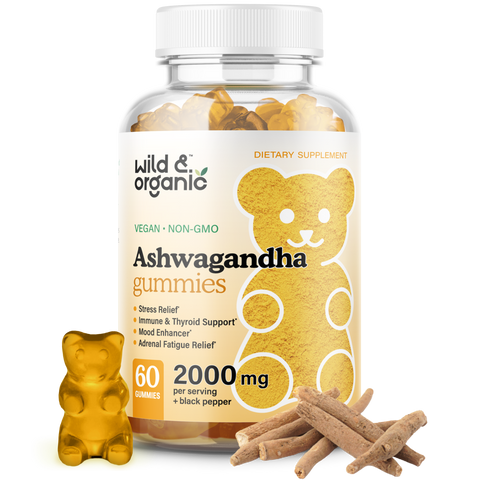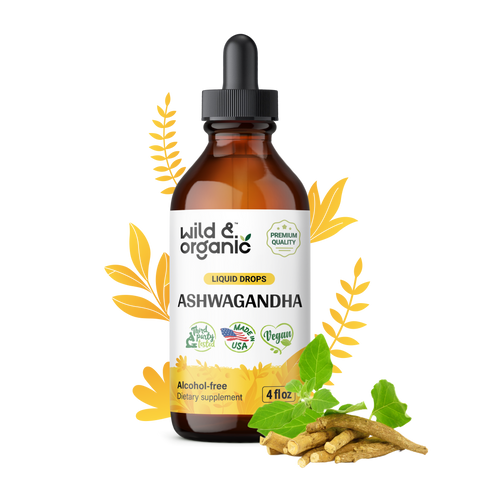Ashwagandha, also known as Withania somnifera, is a powerful herb in Ayurvedic medicine, renowned for its restorative and rejuvenating properties. Originating from India, this ancient herb has been used for over 3,000 years to alleviate stress, increase energy levels, and improve concentration. As an adaptogenic herb, ashwagandha has the unique ability to balance different systems within the body, aiding in stress reduction [1], bolstering immune function, and enhancing cognitive performance, thereby contributing to overall well-being and vitality.
Given its myriad health benefits, this herb has become a popular supplement, leading many to explore the best ashwagandha root dosage for maximum benefits. Understanding the right amount to consume is crucial, as it plays a pivotal role in the herb's efficacy and the overall impact on one’s health. In this article, we will delve deep into the guidelines and considerations for daily ashwagandha limit, shedding light on how to harness the full potential of this esteemed herb to influence the best on our health.
Ashwagandha Recommended Daily Dose: What Amounts of This Unique herb are Effective?
Ashwagandha Maximum Dose: Why Is It Important to Follow The Recommendations?
Ashwagandha is revered for its adaptogenic properties, meaning it helps the body maintain balance and adapt to stress, and it has demonstrated efficacy in improving cognitive function, reducing anxiety, and enhancing overall well-being. Following the recommended dosage of ashwagandha is crucial for several reasons. A high dose of ashwagandha can range from mild to severe side effects. A low dose of ashwagandha can be insufficient, without bringing its desired effects.
Like any supplement, taking the correct amount is important to avoid any adverse effects and to ensure optimal benefits:
- Safety Concerns: While ashwagandha is generally well-tolerated, high doses might cause symptoms like upset stomach, diarrhea, and vomiting in some individuals. It is also essential to consider interactions with other medications and underlying health conditions, making it necessary to follow dosing guidelines diligently.
- Efficacy: The efficacy of ashwagandha is highly dose-dependent. Inadequate or excessive dosages may not provide the desired therapeutic effects, causing individuals to miss out on the benefits.
- Medical Guidance: For those on medication or with pre-existing medical conditions, exceeding the recommended dosage of ashwagandha without consulting healthcare providers can result in negative interactions and impacts on health.
What Factors Influence the Recommended Dosage?
While exploring ashwagandha effective dose, it is necessary to pay attention to different aspects which can influence how much ashwagandha you should take daily. These aspects may include your level of health, age, weight, your desired effects and health goals, as well as individual sensitivity and other factors. Let’s figure out each of these to determine the best ashwagandha serving size.
Before we start exploring your ashwagandha recommended dosage, it’s crucial to state that one needs to start with a smaller dose, then gradually increase it, paying attention to how the body responds. Consulting with a healthcare provider or a qualified herbalist is also recommended.
Health Status
People with certain health conditions or those who are pregnant or breastfeeding may need to adjust their prescribed dosage or avoid ashwagandha altogether. Those with autoimmune conditions, thyroid disorders, or on medication may require a customized dosage under medical supervision.
- For healthy individuals a general starting dose could be 300–500 mg of a root extract daily.
- For those having any health complications, consultation with a healthcare provider is crucial to determine a safe and effective dose.
Age and Weight
Like with other supplements or medications, body weight and age can also play a role in determining the ideal dosage. Larger and older individuals may require a different dose than smaller and younger ones.
- Age: Young adults (18-25) are advised to take 300–500 mg daily as a common starting point. For adults (26-64) the recommended dosage depends on individual needs, but usually it is 300-1000 mg daily. Seniors (65+) are recommended to start with a lower dose, like 200-300 mg, adjusting it as needed based on tolerance and effects.
- Weight: Typically, the dosage is calculated based on 3 to 5 milligrams per pound of body weight. For those who are below 140 pounds, the starting point is 300-350 mg. 500 mg of ashwagandha per day is appropriate for those who are 140-220 pounds. Lastly, those who are above 220 pounds may require around 600-1000 mg of ashwagandha per day.
Preferable Effects and Health Goals
The reason for taking ashwagandha can significantly influence the recommended dose. Whether it is being consumed for stress reduction, enhanced cognitive performance, improved energy levels, or other health benefits, the amount required may vary depending on the desired outcomes.
- If you feel that stress is overwhelming, start with 300–500 mg of high-concentration full-spectrum ashwa-extract daily.
- If you are striving to ignite your cognitive performance, like mnemonic skills, focus and learning, 500–1000 mg of ashwagandha daily is enough.
- For better and deeper sleep, consider higher doses, around 600–1200 mg before bedtime.
Individual Sensitivity
Every individual has unique biochemistry and sensitivity to herbs and supplements may vary. Some people may experience the desired effects with a lower dose, while others may need a higher dose. So if you monitor your responses, you are more likely to adjust the dosage accordingly to your health needs and experience the various health benefits this herb has to offer.
- Highly sensitive people should start with a lower dose of ashwagandha. This is around 200-300 mg per day. Then, based on the body's reaction, one can gradually increase the dosage and keep monitoring his/her responses.
- Moderately sensitive people are recommended with a general starting dose of 300–500 mg. If you feel that you are not getting the desired effects, slightly increase the dosage and monitor your reactions.
- People with low sensitivity may tolerate higher initial doses, around 500–1000 mg, depending on individual tolerance and desired effects.
What is the Recommended Dose of Ashwagandha Needed to Achieve Different Health Goals?
Now you know there are several aspects that influence how much ashwagandha your body needs. Going further, we’ll discuss the exact dosage recommendations based on particular health needs. And yes, ashwagandha’s dosage can indeed be dependent on which specific health benefit is being targeted.
Let's discuss the recommended dosages for different health benefits such as stress and anxiety relief, blood sugar levels, fertility and more.
Stress and Anxiety Relief
Classified as an adaptogen, ashwagandha can effectively reduce cortisol levels, the body’s primary stress hormone, thus aiding in reducing stress and anxiety. You might ask: how many mg of ashwagandha per day for anxiety relief is enough?
Indicators may vary, but generally Ashwagandha dosage for anxiety and stress management can range from 300 to 500 mg of a high-concentration full-spectrum extract. Of course, some individuals may require a higher dose for optimal results, but it’s crucial to start lower and increase gradually.
Blood Sugar Levels Control
Ashwagandha has demonstrated the ability to lower blood sugar levels and improve insulin sensitivity in muscle cells [2]. The recommended dosage for this purpose is 250-500 mg per day. Individuals with diabetes or those on blood sugar lowering medications should monitor blood glucose levels closely and consult a healthcare provider for appropriate dosing and to avoid any unforeseen complications.
Fertility Boost
Thanks to its adaptogenic properties, ashwagandha can also be helpful in supporting reproductive health in both men and women. How much ashwagandha per day for women and men is required?
The recommended ashwagandha dosage for men is 5 g taken for about 3 months. This duration will allow for improvements in semen quality and testosterone production [3], [4].
Ashwagandha dose for women may vary, but generally, a daily dose of around 300–500 mg of a high-concentration full-spectrum extract is recommended. This herb can be especially beneficial in alleviating PMS, combating such symptoms as breast tenderness, abdominal cramps, irritability and mood swings.
Muscle Growth and Strength
This adaptogenic herb can significantly contribute to muscle mass and strength [5] enhancement by reducing body fat and increasing testosterone levels. A regimen combining regular exercise, adequate protein intake, and ashwagandha supplementation can significantly optimize this process.
500–600 mg of a root extract per day has been shown to provide benefits in muscle strength and recovery.
Inflammation Management and Infection Protection
Ashwagandha possesses anti-inflammatory and immunomodulatory properties, making it a viable supplement for reducing inflammation and protecting the body against various infections [6].
To bolster your body’s natural defenses, a daily dose of 250–500 mg of a high-concentration extract is recommended.
Enhanced Memory
Ashwagandha’s ability to mitigate stress and promote antioxidant activity helps in enhancing cognitive functions and improving memory [7]. For cognitive enhancement and memory boost, 300–500 mg of root extract daily is required. Utilizing high-concentration, full-spectrum extracts, while maintaining consistency and proper duration, can aid in reaping optimal cognitive benefits.
Reminder: it’s essential to remember that these recommendations are generalized and may need adjustments based on individual responses, medical history, and specific needs.
One question remains open: how often should you take ashwagandha? Well, the question is rather hard-to-answer as too many factors influence the frequency of ashwagandha intake. It can depend on the specific health goals, the form of Ashwagandha being used, individual health conditions, and personal tolerance levels. However, most studies and traditional uses recommend taking ashwagandha once or twice daily to experience its benefits effectively. It is also recommended to follow at least a 3 month-regimen to see noticeable results.
What Is The Recommended Dosage For Different Forms Of Ashwagandha Supplements?
Much like any other dietary supplements, ashwagandha comes in several forms. It's crucial to consider the concentration and the form it’s in, as they can substantially impact the effective dosage.
Let’s discuss how different forms of ashwagandha have varying dosage guidelines.
Gummies
Chewable gummies are a fun and tasty way to supplement your self-care routine. Concentration of the main components can vary, so it’s important to refer to the product label. Follow the manufacturer's recommended dosage, usually one or two gummies per day.
Wild & Organic Ashwagandha Gummies
Tinctures (Liquid Extracts)
Tinctures, as a go-to solution, offer a convenient and fast way to enrich your regimen. They contain concentrated liquid extracts that are usually mixed with water or another beverage. They also allow for easy adjustment of the dosage and may have faster absorption.
Typically, 30 drops (approximately 1.5 ml) or one dropper two times per day are recommended, but refer to the product label for exact dosing. Strictly adhere to manufacturer or healthcare provider guidelines.
Wild & Organic Ashwagandha Tincture - 4 fl.oz. Bottle
Capsules
Capsules are a traditional form of use, they are convenient and provide a measured dose of main components, often in a concentrated form. They are usually taken with water, and the dosage may vary based on individual needs and product concentrations.
The general recommendation is taking 300–500 mg of standardized ashwa-root extract per day, divided into one or two doses. Referring to product’s labeling is also recommended, as capsule potency may differ widely between manufacturers.
Powders
Powders are versatile and can be mixed with water, milk, honey, or incorporated into smoothies or other recipes. They usually provide main components in their more natural, less concentrated form. Recommended dosage is 3–6 grams of root powder per day, taken in two or three doses.
Safety Recommendations
While Ashwagandha is generally considered safe for most people when taken in recommended dosages, it's crucial to follow safety recommendations to avoid adverse reactions or interactions:
- Consult with a healthcare provider if you have any specific health conditions;
- Pregnant or breastfeeding women should also consult with a healthcare provider due to potential risks associated with its use.
- Begin with a smaller dose to monitor your body's reaction. If needed and there are no adverse reactions, gradually increase the dose.
- Do not exceed the recommended dose as stated on the product label or by a healthcare provider to avoid potential side effects.
- Be aware of interactions as ashwagandha may interact with certain medications such as immunosuppressants, sedatives, and thyroid medications.
- Regularly monitor the effects of the supplement and report any adverse reactions to your healthcare provider immediately. Your healthcare provider may also adjust your dosage based on your response to the supplement.
- To minimize the risk of gastrointestinal distress, it’s generally recommended to take Ashwagandha with meals or food.
- Be cautious about combining ashwagandha with other supplements, especially those with similar effects, unless advised by a healthcare provider.
- The combination of Ashwagandha with alcohol or other substances needs to be approached with caution due to interactions or enhanced effects.
Final Thought
Determining the right daily dosage of ashwagandha is a pivotal factor in leveraging the maximum benefits this adaptogenic herb has to offer. With its profound impact on stress reduction, cognitive performance enhancement, and myriad other health benefits, ashwagandha stands as a must-have supplement in the self-care arsenal. The factors influencing the right dosage are numerous: they widely depend on individual factors such as age, weight, health status, desired effects, and the form in which it is consumed.
We're all built differently, so our responses and tolerance levels vary. Therefore we recommend starting with a lower dosage and progressively adjusting it. Don’t forget about consulting with a healthcare provider. This is important because different forms like capsules, powders, gummies, and tinctures come with their specific recommended dosages. Having any pre-existing conditions or taking other medications? Seek guidance from a doctor: this is to ensure the safe and effective use of the supplement, considering potential interactions and contraindications. Take care of yourself and your loved ones!
Resources:
- https://pubmed.ncbi.nlm.nih.gov/31517876/
- https://pubmed.ncbi.nlm.nih.gov/31975514/
- https://pubmed.ncbi.nlm.nih.gov/30466985/
- https://pubmed.ncbi.nlm.nih.gov/19501822/
- https://www.ncbi.nlm.nih.gov/pmc/articles/PMC6266766/
- https://pubmed.ncbi.nlm.nih.gov/19388865/
- https://pubmed.ncbi.nlm.nih.gov/34838432/








